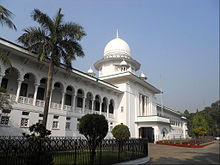
Supreme court of Bangladesh I source - Wikipedia
In the aftermath of mass protests that led to the resignation of Sheikh Hasina as Bangladesh’s Prime Minister, student demonstrators have now shifted their focus to the nation’s judiciary. Thousands of students have gathered around the Bangladesh Supreme Court, demanding the immediate resignation of all judges, including Chief Justice Obaidul Hassan.
Tensions escalated quickly, with reports indicating that the Chief Justice may have fled the Supreme Court premises as the protests intensified. The unrest began after Chief Justice Hassan called a full-court meeting without consulting the newly established interim government, a move that infuriated the protesters. The students allege that the judiciary is complicit in a larger conspiracy, which has fueled their demands for accountability and reform.
In response to the growing unrest, the scheduled full-court meeting was abruptly canceled. However, this did little to deter the protesters, who have given the Chief Justice a one-hour ultimatum to resign. According to reports from Jamuna TV, Chief Justice Obaidul Hassan has agreed “in principle” to step down, following the ultimatum issued by the demonstrators. Hassan, who was appointed to lead the Supreme Court last year, is widely viewed as a close ally of the ousted Prime Minister Hasina.
These latest protests come just days after a student-led uprising against government hiring policies led to the formation of an interim government, now headed by Nobel Peace Prize laureate Muhammad Yunus. The violent protests that resulted in the downfall of the 76-year-old Prime Minister Sheikh Hasina claimed the lives of at least 450 people over the course of more than a month. Hasina, one of Asia’s longest-serving leaders, faces serious allegations, including murder, enforced disappearances, money laundering, and corruption.
also read : S Jaishankar Addresses All-Party Meeting on Bangladesh Crisis
Following the resignation of Sheikh Hasina on August 5, she reportedly fled the country under immense pressure from millions of protesters. In the wake of her departure, an interim government was installed in Bangladesh on Thursday, with Nobel Prize-winning economist Muhammad Yunus at the helm. According to the country’s constitution, elections must be called within 90 days, but there has been no official statement from Yunus, the military, or the president regarding the election timeline.







